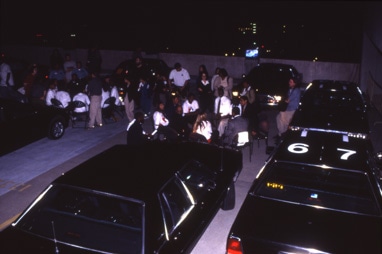Biblically Inflected Discourse and The Imperialist Project
Biblically inflected national discourse, along with attendant hopes and fears, has persisted, perhaps because apocalyptic and covenantal images are expedient both in motivating governments’ foreign-relations policy and action, and in enforcing compliant behavior at home. Not only have these discourses consistently authorized colonialism in general, 1 and American acquisition of territory and resources in particular, but at the same time they impart an aura of familiarity, historicity, and moral authority, to which much of the population is sure to submit.
Like prior national leaders, George W. Bush, his speechwriters, and members of his administration tap deeply familiar biblical images in the rhetoric motivating various military tactics. The position taken by the Bush administration with respect to the rest of the world clearly falls within the tradition of covenantal, messianic chosenness by God. In his speech on the first anniversary of September 11, 2001, Bush was able to make the same claim about the United States that the writer of John’s gospel makes about Christ: “America is the hope of all mankind. . . . That hope lights our way. And the light shines in the darkness. And the darkness will not overcome it.” 2 In the happy marriage of covenant and apocalypse, the impinging darkness must be fought. The light of the world requires darkness, in order to vanquish it. Throughout the Bush administration’s rhetoric, the United States is described as using its military strength in the role of fulfilling, and ensuring, certain moral obligations for the rest of humanity, thus (both apocalyptically and paradoxically) creating a “new era” of peace and justice. To give but one example, the National Security Strategy of September 2002 (PDF), known best for advocating “pre-emptive strikes,” claims that the United States has a duty “to help make the world not just safer but better” and to “defend liberty and justice because these principles are right and true for all people everywhere.” 3 Here the United States polices “universal” moral obligation for the world. The rhetoric recalls the longstanding tradition of manifest destiny in U.S. nationalism that, as Stephanson argues, “constitute[s] itself not only as prophetic but also universal.” 4
In the National Security Strategy of 2002, and throughout Bush’s speeches, the United States is apocalyptically chosen by “history” to fulfill its calling in the world. As scholar of religion Elizabeth Castelli observes, history actually converges with God in the speech given on the second anniversary of September 11, 2001. Castelli’s observation can be extended to the rest of the discourses produced by the Bush administration: Throughout its documents, “history” seems to be a thinly veiled, secular substitution for “God.” 5 History chooses the United States to lead the world to safety (resulting, of course, from enforced moral conformity):
History has called our nation into action. History has placed a great challenge before us: Will America – with our unique position and power – blink in the face of terror, or will we lead to a freer, more civilized world? There is only one answer: This great country will lead the world to safety, security, peace and freedom. 6
The rhetoric is well crafted. It is, to many minds, as Castelli names it, an “unsettling juxtaposition of nationalism and theological determinism,” but its purpose is, of course, to settle the matter. There is a certain inexorability in having been chosen: “We” (and here individual members of the population are interpellated into a single national mind) must not refuse the call of history/God; “we” must only accept.
The cosmic duty of the chosen nation is, as the fight with “darkness” and terror suggests, accompanied in this rhetoric by the urgency of cosmic battle with evil itself. The current rhetoric provoking fear of terrorism seems to be rooted in the apocalyptic heritage of the nation. The language Bush uses to describe terrorists in their caves and hiding places evokes an image of lurking evil, threatening the nation at every turn. The evil terrorists are those who (like Satan, presumably) “seek to master the minds and souls of others,” over and against which stand “the defenders of human liberty.” 7 Evil is fearful precisely because of its ambitious, murderous irrationality: “Our greatest fear is that terrorists will find a shortcut to their mad ambitions when an outlaw regime supplies them with the technologies to kill on a massive scale.” 8 Thus, the rooting out of “hidden evil” and “mad ambition,” makes palatable rhetoric that continually demands weapons inspections in Iraq.
Moreover, within the discourse of the Bush administration, external threats are portrayed as having infiltrated the borders of the nation, thus necessitating increased internal scrutiny. Fear of “evil among us” ensures acquiescence with a demand for intensified domestic policing. Many proposals go uncontested, both formal and informal, encouraging people to watch for and report anything suspicious, in short, to spy on their neighbors. Such an apocalyptic fear of an internal hidden threat clearly grounds and justifies the disappearances of those who look Arab, Muslim, or South Asian in the United States after September 11, 2001. The U.S.A. Patriot Act allows individual’s (mainly people of color’s) rights to be suppressed in the name of exposing perceived hidden threats.
- The covenantal/apocalyptic quest for a new land, and the apocalyptic rooting out of “evil” inhabitants and their practices, are very much a part of Western colonizing identity. See Catherine Keller, Apocalypse Now and Then: A Feminist Guide to the End of the World (Boston: Beacon Press, 1996); Alain Milhou, “Apocalypticism in Central and South American Colonialism,” in The Encyclopedia of Apocalypticism, ed. Stephen J. Stein, vol. 3, Apocalypticism in the Modern Period and the Contemporary Age (New York: Continuum, 1999), 3-35; and Reiner Smolinski, “Apocalypticism in Colonial North America,” in The Encyclopedia of Apocalypticism, ed. Stephen J. Stein, vol. 3, Apocalypticism in the Modern Period and the Contemporary Age (New York: Continuum, 1999), 36-71. Daniel Elazar argues (with no sense of irony) that “frontiersmen . . . that is to say, people who have gone out to settle new areas where there were no established patterns of governance . . . are to be found among the most active covenanters.” Elazar, “The Political Theory of Covenant: Biblical Origins and Modern Developments,” Publius: The Journal of Federalism 10, no. 4 (1980): 3-30, at 13. In short, covenant, apocalypse, and colonialism are habitual bedfellows.[↑]
- George W. Bush, “President’s Remarks to the Nation” (New York, September 11, 2002), http://www.whitehouse.gov/news/releases/2002/09/20020911-3.html. For a brilliant reading of the apocalyptic logic of this citation, see Elizabeth A. Castelli, “Globalization, Transnational Feminisms, and the Future of Biblical Critique” (paper presented at the Global Future of Feminist New Testament Studies conference, Scripps College, Claremont, CA, February 28, 2003).[↑]
- The White House, National Security Council, The National Security Strategy of the United States of America (September 17, 2002): 1, 2, http://www.whitehouse.gov/nsc/nss.pdf.[↑]
- Stephanson, Manifest Destiny, xiii.[↑]
- Tony Blair is also fond of deifying history. For instance, during his speech to the U.S. Congress on July 17, 2003, as reported in the BBC News (July 18, 2003), Blair made assertions about what history would forgive (being wrong about weapons of mass destruction in Iraq) and what it would not forgive (hesitation in the face of menace).[↑]
- George W. Bush, “Remarks by the President in Address to the Nation,” (Washington DC, June 6, 2002), http://www.whitehouse.gov/news/releases/2002/06/20020606-8.html.[↑]
- Bush, “President’s Remarks to the Nation” (September 11, 2002).[↑]
- Putting President Bush’s speech, “Remarks by the President in Address to the United Nations General Assembly” (New York, September 2002, http://www.whitehouse.gov/news/releases/2002/09/20020912-1.html); together with the assertion in the The National Security Strategy of the United States of America that the United States is above the jurisdiction of the International Criminal Court (31), and with the United States’s record of arms dealing, Bush seems to be acknowledging that the United States is the “outlaw regime” that provides “shortcuts to mad ambition.” Such a blatant, unconscious self-indictment is perhaps to be expected in such a flamboyant accusation.[↑]



